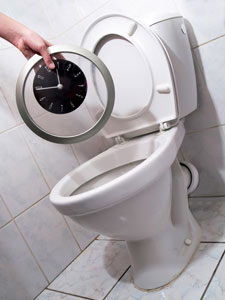The Constipation Struggle
Graphic as it may sound, this topic is of great importance to those facing the uncomfortable symptoms of digestive issues such as constipation. Constipation is a gastro-intestinal symptom that occurs when bowel movements are less frequent due to a harder stool which is more difficult to pass. Most people at some point in their lives will experience constipation. In most cases, constipation is only temporary and not serious. Understanding its causes, prevention, and treatment will help most people find relief.
Water and Constipation
Does drinking water help you poop? For the most part, yes. There are two types of constipation, with one being more severe than the other. Slow transit constipation is the most common form. Lack of fiber and inadequate water in the diet are common causes of slow transit constipation. One of the major symptoms of this type is dehydration, meaning that drinking adequate amounts of water will greatly improve symptoms. The other type of constipation, outlet delay, has to do more with loss of function in the pelvic area, and occurs more often in senior citizens.
How do we get constipated?

Well, food flows through the small intestine as a liquid mixture of digestive juices and the food you eat. By the time it reaches the large intestine, all the nutrients have been absorbed. The large intestine has one main function: to absorb water from the waste liquid, and turn it into a waste solid, known as the stool. The hard and dry stools of constipation occur when the colon absorbs too much water, or if the colon's muscle contractions are too slow or sluggish, which results in the stool moving through the colon at too slow a pace. These hard, dry stools are difficult to pass, as they cause strain. The reason they are difficult to pass is that the hard, dry stool actually sticks to the dry wall of the colon and requires that the colon develop high-pressure waves to be moved. Since the body needs help to remove the stool, strain is then placed on the abdominal muscles to contribute the necessary force to push out the stool. This straining can have negative effects to the body, such as the development of hernias, varicose veins, hiatus hernia (upward pressure forcing the stomach into the chest), diverticulitis and diverticulosis (weakening and infection of the colon wall), hemorrhoids, anal fissures and fistulae. Colorectal cancers may also be more common in patients with lifelong habit constipation.
How does water help with constipation?
There are ways to prevent this. Liquids, like water and juice, add fluid to the colon and bulk to stools, making bowel movements softer and easier to pass. Because the colon needs water to do its job, dehydration can be a major cause of constipation.
How much water should I drink for constipation?
Now that we know dehydration is a main cause of constipation, your first priority should be getting plenty of clear and non-caffeinated fluids. If you find yourself struggling with constipation symptoms, it will benefit you most to drink at least 8-10 glasses (60-80 oz.) of pure water daily.
Since many constipation sufferers are dehydrated, a major way of preventing this uncomfortable disorder is to drink an extra two to four glasses of water per day. That is on top of the recommended 8-10. Along with that, alcoholic and caffeinated beverages should be avoided. However, water may not be able to do it totally alone. Fluids will not promote normal bowel function on their own, as the small intestine can also absorb of this fluid. It is best to combine high fluid intake with a high dietary fiber, otherwise, people will just urinate more.
Constipation could also be caused by other disorders, which also stem from dehydration, such as uremia, a kidney disorder. Chronic constipation can also lead to more severe gastro-intestinal disorders if left untreated, such as colorectal cancer, as noted above.
Natural remedies to ease constipation
- Apples – They are high in fiber and full of vitamins. As the apple fiber travels through your G.I tract, it combines with water to form larger, softer stools that pass easily through your bowels. Pears have the same effect, in case you prefer their taste.
- Grapes – A very powerful and proven constipation treatment. They contain cellulose, sugar, and organic acid which make them a natural laxative.
- Lemon – Squeeze lemon juice in a glass of warm water and drink first thing in the morning to stimulate bowel movements.
- Spinach – Raw spinach cleans, reconstructs and regenerates your intestinal tract. Spinach is one of the most beneficial food for the digestive tract.
The importance of fiber cannot be stressed enough when suffering from constipation. Fibers are divided into water soluble and insoluble fibers. Both these types help in digestion, with soluble fibers slowing down digestion to aid the absorption of nutrients from food and insoluble fiber providing bulk to waste products, helping it move quickly and easily through the colon. Staying hydrated and eating healthily are the two key factors in boosting your digestive system. Your digestive system is the best way to eliminate toxins from our body. Making life-improving changes today by drinking more water, eating more fiber!



